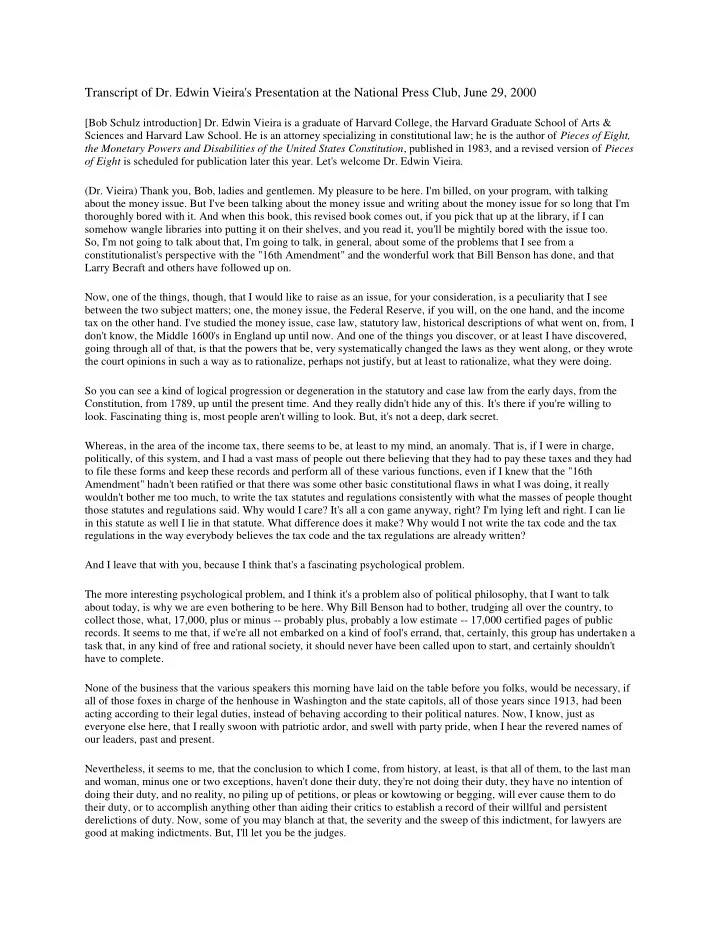

Transcript of Dr. Edwin Vieira's Presentation at the National Press Club, June 29, 2000 [Bob Schulz introduction] Dr. Edwin Vieira is a graduate of Harvard College, the Harvard Graduate School of Arts & Sciences and Harvard Law School. He is an attorney specializing in constitutional law; he is the author of Pieces of Eight, the Monetary Powers and Disabilities of the United States Constitution , published in 1983, and a revised version of Pieces of Eight is scheduled for publication later this year. Let's welcome Dr. Edwin Vieira. (Dr. Vieira) Thank you, Bob, ladies and gentlemen. My pleasure to be here. I'm billed, on your program, with talking about the money issue. But I've been talking about the money issue and writing about the money issue for so long that I'm thoroughly bored with it. And when this book, this revised book comes out, if you pick that up at the library, if I can somehow wangle libraries into putting it on their shelves, and you read it, you'll be mightily bored with the issue too. So, I'm not going to talk about that, I'm going to talk, in general, about some of the problems that I see from a constitutionalist's perspective with the "16th Amendment" and the wonderful work that Bill Benson has done, and that Larry Becraft and others have followed up on. Now, one of the things, though, that I would like to raise as an issue, for your consideration, is a peculiarity that I see between the two subject matters; one, the money issue, the Federal Reserve, if you will, on the one hand, and the income tax on the other hand. I've studied the money issue, case law, statutory law, historical descriptions of what went on, from, I don't know, the Middle 1600's in England up until now. And one of the things you discover, or at least I have discovered, going through all of that, is that the powers that be, very systematically changed the laws as they went along, or they wrote the court opinions in such a way as to rationalize, perhaps not justify, but at least to rationalize, what they were doing. So you can see a kind of logical progression or degeneration in the statutory and case law from the early days, from the Constitution, from 1789, up until the present time. And they really didn't hide any of this. It's there if you're willing to look. Fascinating thing is, most people aren't willing to look. But, it's not a deep, dark secret. Whereas, in the area of the income tax, there seems to be, at least to my mind, an anomaly. That is, if I were in charge, politically, of this system, and I had a vast mass of people out there believing that they had to pay these taxes and they had to file these forms and keep these records and perform all of these various functions, even if I knew that the "16th Amendment" hadn't been ratified or that there was some other basic constitutional flaws in what I was doing, it really wouldn't bother me too much, to write the tax statutes and regulations consistently with what the masses of people thought those statutes and regulations said. Why would I care? It's all a con game anyway, right? I'm lying left and right. I can lie in this statute as well I lie in that statute. What difference does it make? Why would I not write the tax code and the tax regulations in the way everybody believes the tax code and the tax regulations are already written? And I leave that with you, because I think that's a fascinating psychological problem. The more interesting psychological problem, and I think it's a problem also of political philosophy, that I want to talk about today, is why we are even bothering to be here. Why Bill Benson had to bother, trudging all over the country, to collect those, what, 17,000, plus or minus -- probably plus, probably a low estimate -- 17,000 certified pages of public records. It seems to me that, if we're all not embarked on a kind of fool's errand, that, certainly, this group has undertaken a task that, in any kind of free and rational society, it should never have been called upon to start, and certainly shouldn't have to complete. None of the business that the various speakers this morning have laid on the table before you folks, would be necessary, if all of those foxes in charge of the henhouse in Washington and the state capitols, all of those years since 1913, had been acting according to their legal duties, instead of behaving according to their political natures. Now, I know, just as everyone else here, that I really swoon with patriotic ardor, and swell with party pride, when I hear the revered names of our leaders, past and present. Nevertheless, it seems to me, that the conclusion to which I come, from history, at least, is that all of them, to the last man and woman, minus one or two exceptions, haven't done their duty, they're not doing their duty, they have no intention of doing their duty, and no reality, no piling up of petitions, or pleas or kowtowing or begging, will ever cause them to do their duty, or to accomplish anything other than aiding their critics to establish a record of their willful and persistent derelictions of duty. Now, some of you may blanch at that, the severity and the sweep of this indictment, for lawyers are good at making indictments. But, I'll let you be the judges.
Recommend
More recommend